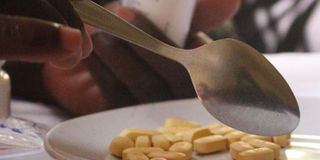Authorities rekindle plan to use drones to deliver ARVs

Demonstration. A sex worker shows how she divides her monthly dosage of ARVs at Kasensero Landing Site on January 7. Authorities in Kalangala intend to start distributing ARVs using drones. PHOTO BY RACHEL MABALA
What you need to know:
- The drone project, which was supposed to start in March, was delayed following the outbreak of the Covid-19 pandemic.
Authorities in Kalangala District have revived the plan to use medical drones to deliver anti-retroviral (ARVs) drugs to people living with HIV/Aids in distant islands.
The drone project, which was supposed to start in March, was delayed following the outbreak of the Covid-19 pandemic.
Officials say the drones are expected to be tested in a few weeks.
Mr Samuel Katumba, the executive director of Sustainable Development Initiatives, a community organisation managing the project, on Monday said they plan to start with two drones, which will be based at Kalangala Health Centre IV.
He said the drones will first distribute the drugs in Kitobo, Mukaka, Ssemawundo, Kusu and Banda landing sites in Bufumira Sub-county.
“There is inadequacy in delivery of ARVs where majority of people in distant islands miss drugs, especially when they fail to show up on the monthly refill appointments by the designated health facilities,” Mr Katumba said.
The district HIV/Aids prevalence rate stands at 16 per cent.
Leaders said the project is timely because they have been facing challenges in transporting health workers and drugs to different islands.
Mr Willy Lugoloobi, the district chairperson, said they spend about Shs200,000 to facilitate a health worker to transport drugs on a boat from Buggala, the main island, to other distant ones.
“Despite doing all this, our health workers cannot reach the more than 60 islands because of inadequate resources,” he said.
Dr Hilary Bitakaramire, the district health officer, said the drones will also help in quick delivery of blood samples for tuberculosis and HIV viral load samples as well as results.
Mr Katumba said the drugs will be packed in small boxes and the drone will find delivery locations using Global Positioning System (GPS) technology.
Health centres that need the drugs will place their orders through mobile phone texts, WhatsApp or calls.
The drugs will frequently be received by trained clients in distant islands to offload the drones and dispense the drugs.
The district has only 10 health facilities serving more than 20,000 people on antiretroviral treatment. Similar technology is already being used in the neigbouring Rwanda to deliver light medical supplies to remote areas.
Each drone has capacity to carry drugs and other light medical supplies of about 25 kilogrammes.




